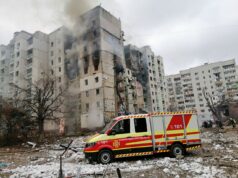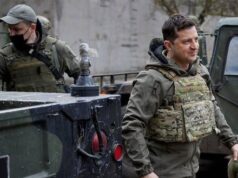

Meanwhile, the Security Council had a hearing Wednesday when top officials of the United Nations briefed it and called for the adherence to the fundamental principles enshrined in the UN Charter, including the respecting of Ukraine’s sovereignty and territorial integrity, and ensuring respect for universal human rights.
The UN deputy Secretary General Jan Eliasson, who together with the Assistant Secretary General for Human Rights, Ivan Simonovic, briefed the UNSC on the ongoing developments in the tense region, said that Ban’s mission to Moscow and Kiev was taking place in the “spirit of the UN Charter”.
Ban Ki Moon to meet Putin…..
The Secretary General is first flying to Moscow where he is meeting President Vladimir Putin, Foreign Minister Sergey Lavrov and other senior political figures, according to Ban’s office in New York.
Subsequently, on Friday, Ban will visit Kiev where he will hold meetings with Ukraine’s Acting President Oleksandr Turchynov, Prime Minister Arseniy Yatsenyuk and other politicians. In Kiev, Ban will also meet members of the UN Human Rights’ Monitoring Mission.
Eliasson, who visited the Ukraine during the earlier part of March, maintained that since his visit the crisis had continued to deepen, giving rise to tensions in Crimea and eastern Ukraine.
He added that “we are now faced with risks of a dangerous further escalation that could have ramifications for international peace and security and have serious significance for this Council and for the United Nations”.
There is anger in the US over the action taken by Russia in pushing the Crimea referendum and Putin signing a treaty that makes Crimea part of the Russian Federation.
While the European Union and the US are, incrementally, resorting to what are described here as “targeted sanctions” against Russian and Crimean officials, the Ukrainian Government has categorically stated it would never
accept Crimea’s independence or annexation, and described Crimea as an integral part of Ukraine whose prime minister has, meanwhile, expressed concern that the conflict in the Crimean peninsula is escalating from a political to a military one.
There is also a ratcheting up of the rhetoric in the crisis-plagued region, with Eliasson pointing out that this followed reports about the killing of a Ukrainian officer from a Ukrainian military base on the outskirts of Simferopol.
Ukraine Military Officer killed……
The UNSC also heard Eliasson’s narration that following the killing of the Ukrainian military officer, the Ukrainian deputy prime minister and defence minister planned to travel to Crimea, though the Crimean leadership had stated
that Ukraine’s officials would not be allowed to enter Crimea.
Eliasson said that the situation underscored the “dire need” for immediately opening a direct dialogue between Moscow and Kiev.
Meanwhile, according to Eliasson, two Ukrainian naval bases in Crimea were taken over by pro-Russian forces or unidentified groups. While the seizure of the bases took placewithout bloodshed, such developments obviously were replete with “grave risks”.
“The Secretary General has constantly underlined the importance of avoiding further provocative actions and refraining from incitement,” Eliasson emphasized. These latest events, he said, had heightened tensions and added
“new layers of complexity to an already precarious situation”.
Eliasson also reminded that Russia and Ukraine remained neighbours, with close, often complex, historic, cultural, economic and political ties. “It is our view that it is in the interest of all of us that these two nations have positive ties, with each other and with the broader region. But the first step in that direction has to be based on immediate de-escalation and restraint in the present crisis.”
Repeating some of the views already voiced by Ban, Eliasson said that it was clear that “we are at the crossroads”. If positions continued to harden and the rhetoric sharpened, there was a “great risk of a dangerous downward spiral”. He said that the focus should be to engage in direct dialogue between Moscow and Kiev aimed at agreeing on specific measures aimed at paving the way towards a diplomatic solution.
Emphasizing that the UN primary diplomatic tool is constructive dialogue on the basis of the principles of the UN Charter concerning pacific settlement of disputes, Eliasson went to say that the UN would continue to play its role of
promoting dialogue for a peaceful and joint resolution of this crisis “which now has become more serious than ever”.
The dynamics in the Ukraine were unleashed by months of political unrest culminating in the removal by parliament of President Viktor Yanukovych in February, leading to a sharp rise in tensions in the country’s autonomous region
of Crimea where additional Russian military were recently deployed and a referendum was held on Sunday.
— BERNAMA










